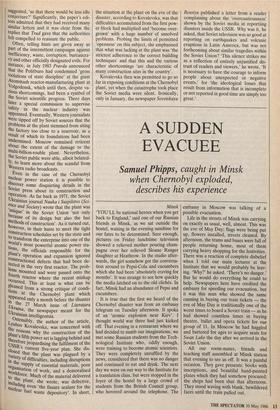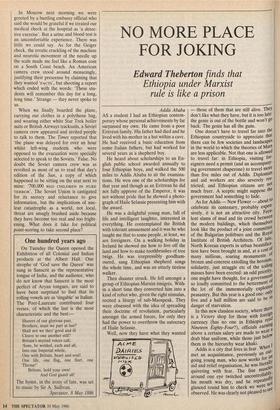A SUDDEN EVACUEE
Samuel Phipps, caught in Minsk
when Chernobyl exploded, describes his experience
Minsk 'YOU'LL be national heroes when you get back to England,' said one of our Russian friends in Minsk, as we sat outside the hostel, waiting in the evening sunshine for our fates to be determined. Sure enough, pictures on Friday lunchtime television showed a relieved mother pouring cham- pagne over her relieved Sloane Ranger daughter at Heathrow. In the studio after- wards, the girl somehow got the conversa- tion around to Pepsi-Cola and cucumbers which she had been 'absolutely craving for months'. It was strange to see how quickly the media latched on to the old clichés. In fact, Minsk had an abundance of Pepsi and cucumbers.
It is true that the first we heard of the Chernobyl disaster was from an embassy telegram on Tuesday afternoon. It spoke of an 'atomic explosion near Kiev'. I thought world war three had just kicked off. That evening in a restaurant where we had decided to numb our imaginations, we met some Russian students from the Tech- nological Institute who, oddly enough, were training to become atomic scientists. They were completely unruffled by the news, considered that there was no danger and continued to eat and drink. The next day we were on our way to the Institute for a translation class, but were stopped in the foyer of the hostel by a large crowd of students from the British Council group, who hovered around the telephone. The embassy in Moscow was talking of a possible evacuation.
Life in the streets of Minsk was carrying on exactly as usual, well, almost. This was the eve of May Day; flags were being put up, flowers installed, streets cleaned. By afternoon, the trams and buses were full of people returning home, most of them carrying heavy shopping for the festivities. There was a reaction of complete disbelief when I told our main lecturer at the Institute that we would probably be leav- ing. 'Why?' he asked. 'There's no danger.' But he would do everything he could to help. Newspapers here have credited the embassy for speeding our evacuation, but it was this man who showed the same cunning in buying our train tickets — the eve of May Day is traditionally one of the worst times to board a Soviet train — as he had showed countless times in buying theatre, ballet and opera tickets for our group of 11. In Moscow he had haggled and bartered for ages to acquire seats for Swan Lake the day after we arrived in the Soviet Union.
All our room-mates, friends and teaching staff assembled at Minsk station that evening to see us off. It was a painful occasion. They gave presents: books with inscriptions, and beautiful hand-painted plates which they had somehow procured: the shops had been shut that afternoon. They stood waving with blank, bewildered faces until the train pulled out. In Moscow next morning we were greeted by a bustling embassy official who said she would be grateful if we treated our medical check at the hospital as 'a detec- tive exercise'. But a urine and blood test is an uncomfortable experience. There was little we could say. As for the Geiger check, the erratic crackling of the machine and neurotic movement of the needle up the scale made me feel like a Roman coin on a South Coast beach. An American camera crew stood around menacingly, justifying their prescense by claiming that they wanted `FACTS', but shooting a report which ended with the words: 'These stu- dents will remember this day for a long, long time.' Strange — they never spoke to
US.
When we finally boarded the plane, carrying our clothes in a polythene bag, and wearing either white Star Trek boiler suits or British Airways tracksuits, a Soviet camera crew appeared and invited people to talk to them. The Times reported that 'the plane was delayed for over an hour whilst left-wing students who were opposed to the evacuation were specially selected to speak to the Soviets.' False. No doubt the Soviet camera crew was as revolted as most of us to read that day's edition of the Sun, a copy of which happened to be sitting on the seat next to mine: `700,000 RED CHILDREN IN NUKE TERROR'. The Soviet Union is castigated for its secrecy and reluctance to give information, but the implications of nuc- lear catastrophe as a world, not local, threat are smugly brushed aside because they have become too real and too fright- ening. What does it take for political point-scoring to take second place?



























































 Previous page
Previous page